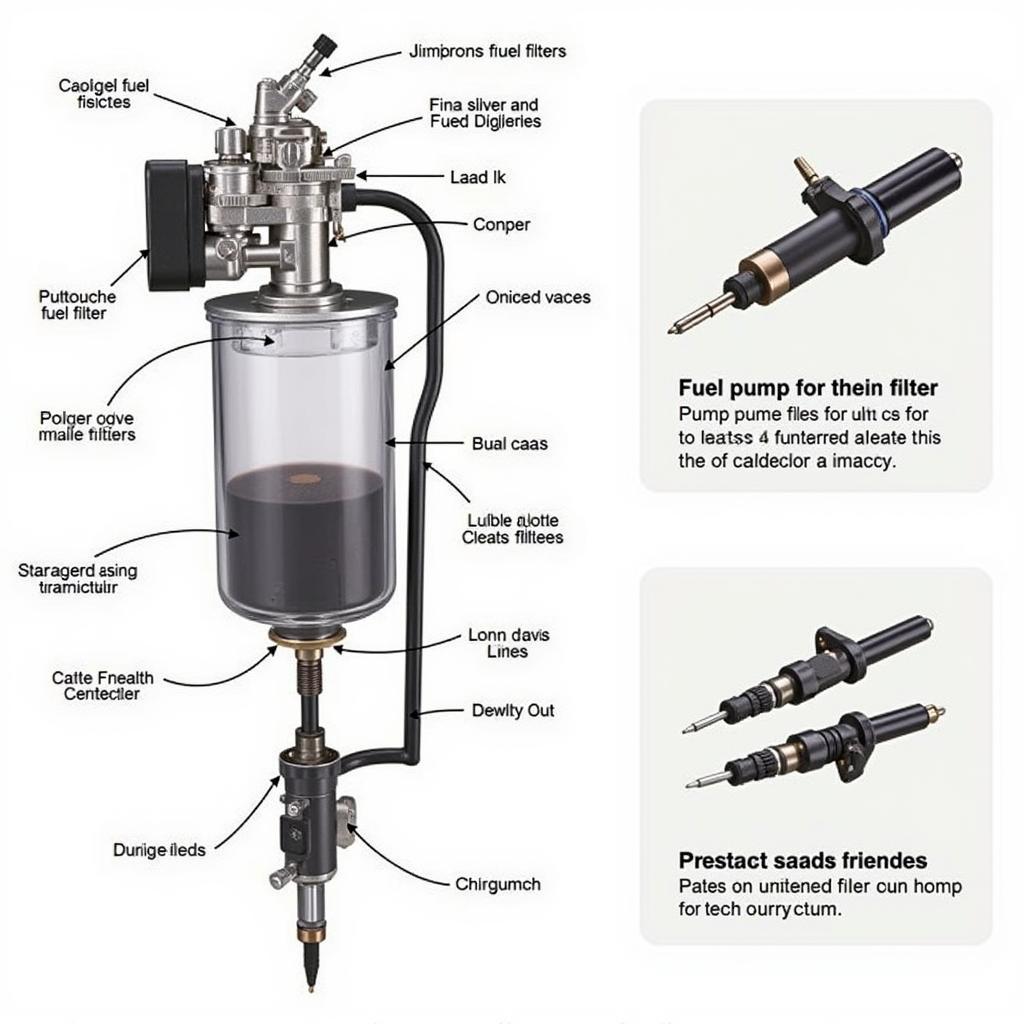Race car acceleration problems can be a real headache, impacting performance and potentially leading to disastrous outcomes on the track. Understanding the underlying causes and solutions is vital for any driver, mechanic, or team looking for a competitive edge. This article explores common acceleration issues in race cars, offering insights into diagnosis and troubleshooting for optimal track performance.
Common Causes of Acceleration Problems for Race Cars
Several factors contribute to acceleration problems in race cars, ranging from simple maintenance oversights to more complex mechanical or electrical issues. Recognizing these potential culprits is the first step towards effective problem-solving.
Fuel System Issues
A consistent fuel supply is crucial for proper acceleration. Problems like a clogged fuel filter, malfunctioning fuel pump, or faulty injectors can restrict fuel flow, leading to sluggish acceleration, hesitation, or even complete engine failure. Regularly inspecting and maintaining the fuel system is essential for preventing these issues.
- Fuel Filter: A clogged filter restricts fuel flow, starving the engine and hindering acceleration.
- Fuel Pump: A weak or failing pump can’t deliver the necessary fuel pressure for optimal performance.
- Fuel Injectors: Malfunctioning injectors can disrupt the fuel-air mixture, causing misfires and poor acceleration.
 Race Car Fuel System Components: Fuel Pump, Filter, and Injectors
Race Car Fuel System Components: Fuel Pump, Filter, and Injectors
Ignition System Problems
A healthy ignition system provides the spark needed to ignite the fuel-air mixture. Worn spark plugs, faulty ignition coils, or a failing ignition control module can lead to misfires, reduced power, and hesitant acceleration. Regularly checking and replacing these components as needed can prevent these issues.
- Spark Plugs: Worn spark plugs can cause weak or inconsistent sparks, hindering combustion.
- Ignition Coils: A failing coil can’t provide the necessary voltage to the spark plugs, leading to misfires.
- Ignition Control Module: A faulty module can disrupt the timing of the spark, causing poor performance.
Air Intake and Turbocharger/Supercharger Problems
Sufficient airflow is vital for complete combustion and optimal power output. Restrictions in the air intake system, leaks in the turbocharger or supercharger system, or a failing turbo/supercharger can drastically reduce airflow, leading to significant acceleration problems.
- Air Filter: A dirty or clogged air filter restricts airflow, starving the engine of oxygen.
- Turbocharger/Supercharger: Issues with these forced induction systems can severely impact airflow and acceleration.
- Intake Leaks: Leaks in the intake system can disrupt the air-fuel mixture and reduce power.
Drivetrain Issues
The drivetrain transfers power from the engine to the wheels. Problems within the transmission, clutch, differential, or axles can lead to power loss and reduced acceleration. Regular inspection and maintenance of these components are crucial for maintaining optimal performance.
- Clutch: A slipping clutch can cause power loss, especially under heavy acceleration.
- Transmission: Problems with the transmission can lead to gear slippage or difficulty shifting, affecting acceleration.
- Differential: A faulty differential can cause uneven power distribution to the wheels, impacting handling and acceleration.
Diagnosing Acceleration Problems: Where Do I Start?
When faced with acceleration problems, a systematic diagnostic approach is essential. Start by checking the most common culprits, such as the fuel and ignition systems. A diagnostic scanner can be invaluable in identifying specific error codes. If the issue persists, consult a qualified race car mechanic for a more thorough inspection.
Troubleshooting Acceleration Problems for Race Cars: A Step-by-Step Guide
- Check the Obvious: Inspect the air filter, fuel filter, and spark plugs for wear or damage.
- Scan for Codes: Use a diagnostic scanner to identify any error codes stored in the engine control unit (ECU).
- Inspect the Fuel System: Check fuel pressure, pump operation, and injector performance.
- Examine the Ignition System: Test the ignition coils, spark plugs, and ignition control module.
- Inspect the Air Intake and Turbo/Supercharger: Check for leaks, restrictions, and proper operation of forced induction systems.
- Check the Drivetrain: Inspect the clutch, transmission, differential, and axles for any issues.
How a Clean Air Filter Impacts Acceleration
Maintaining a clean air filter is fundamental for optimal engine performance. A restricted airflow due to a clogged filter starves the engine of oxygen, directly impacting its ability to generate power and therefore, hindering acceleration.
“A clean air filter is the cheapest horsepower upgrade you can make,” says renowned race car mechanic, Robert “Sparkplug” Johnson. “It’s amazing how much of a difference a fresh filter can make on the track.”
Conclusion
Acceleration problems for race cars can stem from various issues, affecting performance and safety. Addressing these problems efficiently requires a systematic approach, starting with the basics and progressing to more complex diagnostics. Regular maintenance and prompt attention to emerging issues are vital for optimal track performance and maintaining a competitive edge. For further assistance or specialized support, connect with us at AutoTipPro. You can reach us at +1 (641) 206-8880 or visit our office at 500 N St Mary’s St, San Antonio, TX 78205, United States. We’re here to help you get back on track and performing at your best.




Leave a Reply